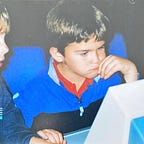All sorts of nouns and adjectives will tell you, “It is fine the way it is”. But the products and services that have changed our lives never understood that statement and went as far as to reject that statement.
“The earth is flat, that’s the way it is”
“We’re on the planet, going to space isn’t an option”
“You listen to music on a record player, that’s the way it is”
Innovation, in many terms is a means for making our lives easier.
How do we make a product or service more useful?
How do we make a product or service more enjoyable?
How do we make a product or service more accessible?
How do we make a product or service more efficient?
How do we make a product or service more meaningful?
One of my favorite high school English teachers often said that words like “more” were not descriptive enough and the usage of such did not equate to good writing. While I do agree, I think it is important that we start with the word “more” while outlining.
What does it mean to make a product or service “more” of something?
Does it imply “bigger, better, faster”. Well those doesn’t get us to a definition either, they are “more” of the same types of vague qualifiers. That is also operating on a false premise. Bigger equals more customers as an idiom rather than causality. That is like saying people like big bears, polls across the country say that people also love catching big fish, big bears also like big fish, therefore people want big phones?
So that is interesting: innovation seems to question the norm, innovation also requires causality at its root, not correlation.
Why do people use a phone? How can we combine resources to make that experience more portable, reliable? How do we make phones affordable enough that a lot of people can have access? What other aspects of communication do people use and how can we put that into a phone? What other things are on the go and how do we put that into a phone.
From this we go from Morse code, to landlines, to cellular phones, to smart phone, to phones that are close to indistinguishable from computers outside of aesthetics.
All of that came from…
How do we make a product or service more useful?
How do we make a product or service more enjoyable?
How do we make a product or service more accessible?
How do we make a product or service more efficient?
How do we make a product or service more meaningful?
The “more” was given causality based quantitative and quantitative definitions. It was based on consumer desire to reduce stress on the trivial, so they could focus on the present.
And yes, you could sidetrack and say people should slow down and enjoy life more… Have you ever seen the movie “Click” with Adam Sandler?
But community and culture were based on this idea that modernity (the state of being modern) is always old; and community and culture was built on this idea of progression.
There a few techniques that I’ve stolen from others and have used as a framework in thinking this way. The first is the physical science idea of “First Principles”, which encourages that the best understand is built upward from the source of truth, not built downward to the source of truth. The second is this idea of “why?”, which also kind of follows first principles. Basically ask “why?” until you understand.
For existence, that will make your mind hurt. But for something like innovation, asking why people like clothes, why do people want good food, why do people want experiences over possession, why do people watch Netflix, why do people want to be heard, why do people want to be valuable, why do people like something I don’t. And for each one of those keep asking “why?” until you find out.
The answer should look basic, conclusive, and lack correlation.
From that answer, innovate upward. You’ll find that it will be easier, you’ll find that you’ve already identified the current logic tree of preference within that category and you can start to do research into how to make it “more” and what that “more” looks like.
Blue sky your noggin off, but be aware that your resources are limited and your time is finite. Wild inspiration is a fundamental component to innovation, but inspiration is lost without application. And application is wasted without understanding.
To those that do have the thoughts and innovative ideas but are overwhelmed: remember Frank Lloyd Wright’s “Falling Water” was not conceived and built overnight, nor was it perfect. Same can be said about just about anything you’ve heard of.
Also, a note to those that say “I can’t, I won’t ever have that thought that makes me rich and famous”: you are probably looking for the wrong things and should actively seek and assist those that are. Participation in another’s innovation is just as admirable.
